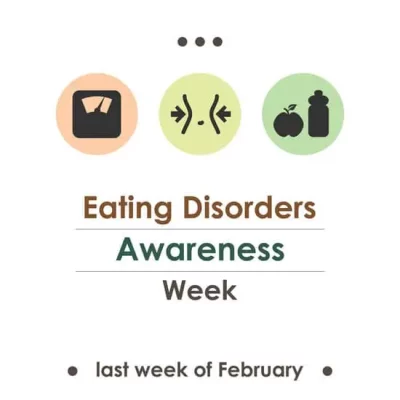Eating Disorders: What are they?
National Eating Disorder Awareness Week was created to recognize that eating disorders are a group of serious and often fatal illnesses. Associated with disturbed eating [i.e. not eating, throwing up what was eaten, overeating, etc.], specifics regarding symptoms, risk factors, and treatments vary based upon the specific eating disorder – however most disorders are linked to distorted body image and thought pattern. Studies have shown that eating disorders are commonly linked to other mental illness – such as anxiety, depression, and obsessive compulsive disorder. Eating disorders are extremely serious and may be fatal if proper help is not received, so it is important to understand the symptoms and risk factors of different disorders.
Signs, Symptoms, and Risk Factors
While many forms of eating disorders to exist, the most commonly diagnosed are: anorexia nervosa [simply referred to as anorexia], bulimia nervosa [often referred to as just bulimia], and binge-eating disorder. Each disorder can be seen through different symptoms, however risk factors for all are relatively the same. In general, risk factors lie within genetics, behaviors, psychology, and social factors. Research alludes that those with families that have a history of eating disorders are more likely than others to develop them. Additionally, negative interactions with others – such as being a victim of body shaming – may lead to the development of eating disorders. Likewise, constant exposure to societal standards of beauty [i.e. being fit and slender] can contribute to the development of disorders.
Anorexia Nervosa
Anorexia is defined as a psychological condition and eating disorder that causes a person to lose more weight than is medically healthy for their age and size. Typically, those with anorexia will maintain a body weight 85% or less than what they are supposed to. Food intake is typically restricted, causing the person to be excessively thin. They may also hold an intense fear of gaining weight and/or a distorted body image. Long term effects of untreated anorexia consist of: anemia, brittle hair and nails, dry skin, low blood pressure, and sluggishness, among other things. Studies indicate that around 0.1% of men and 0.3% to 0.4% of women experience anorexia, and that 25% of those suffering from anorexia are male. They also indicate that males are at a higher risk of dying from anorexia due to being diagnoses later than their female counterparts.
Bulimia Nervosa
Unlike anorexia, bulimia is categorized by the excessive intake of food in a short period of time, followed by the purging of the food [typically by induced vomiting] to avoid gaining weight. Besides vomiting, purging may also be completed through excessive exercise or taking laxatives. Symptoms of bulimia take the shape of: a chronically inflamed or sore throat, worn tooth enamel, acid reflux, and severe dehydration. Studies indicate that 1.5% of young American women, in their lifetime, experience bulimia and that nearly half of those with bulimia also suffer from either anxiety or depression.
Binge-Eating Disorder
Binge-eating disorder (BED) is similar to bulimia in the sense that it, too, is characterized by excessive eating. However, unlike bulimia victims, those suffering with BED do not attempt to purge what they’ve eaten. Instead, BED victims show symptoms such as: excessive eating in a specific amount of time, even when not hungry; eating quickly; overeating; eating alone; and feeling distressed about eating. They may also frequently attempt to diet, without seeing any weight loss. On average, roughly 2.8% of adult Americans face binge-eating disorder and genetics count for nearly half the risk factors for developing BED.
Treatments and Therapy
Treatments for eating disorders take many forms and levels. In general, there are four levels of care considered when a person is attempting to overcome an eating disorder. First, a person may be hospitalized and considered inpatient if they are both medically and psychiatrically unstable. This typically means their vitals are unstable or they may be experiencing complications due to preexisting conditions, such as diabetes. Psychiatrically, they may be experiencing suicidal thoughts or tendencies or their symptoms may be rapidly worsening.
From being inpatient, a person may become residential if they are medically stable but remain psychiatrically unstable. Residential patients require no medical intervention; however, they remain psychiatrically unstable. When residential patients become mostly stable both medically and psychiatrically, they can be considered in partial hospital care. Typically, this means the eating disorder impairs functioning and the person may be still engaging in daily eating disorder behaviors. Lastly, a person can be considered outpatient when they are both medically and psychiatrically stable, though they may still undergo different forms of therapy to help fully overcome their eating disorder.
Various forms of therapy exist to help overcome eating disorders. For example, cognitive behavioral therapy [CBT] aims to help by focusing on beliefs, values, and processes. CBT is short term, compared to other forms of therapy. It helps to modify beliefs and attitudes related to the development of eating disorders. Similarly, acceptance and commitment therapy focuses on behaviors and involves the making of and following through with goals.
National Eating Disorder Awareness Week
The National Eating Disorder Association [NEDA] hosts one week a year dedicated towards raising awareness for eating disorders. During this week, NEDA works to raise awareness for the various forms of eating disorders, in order to help recognize and prevent the disorders. The effort is open to anyone who wishes to help raise awareness and can be followed online through NEDA’s website and social media. This year, NEDA’s Awareness Week will be taking place February 24th through March 1st.
How can we help?
At Makin Wellness, our providers specialize in helping our clients set and achieve their goals for bettering their mental health. Our providers are experienced with cognitive behavioral therapy and guiding the overcoming of eating disorders. Additionally, we also have a nutritional specialist, who can help you set and achieve goals for health eating and weight loss. Visit our website or email us at [email protected] to start your healing journey today!

B.A. Psychology Major | Point Park University
Research Psychology Intern | Makin Wellness, Downtown Pittsburgh
Events Coordinator and Advocate | PPU Strong Women, Strong Girls
Mentor and Academic Events Coordinator | PPU Honors Student Organization








